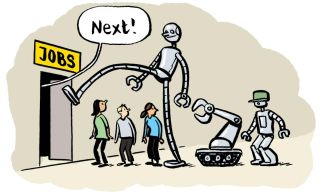Digital automation and the future of work

The report ‘Digital automation and the future of work’by the European Parliament Research Service recognises that the impacts of technological change on work and employment are multifaceted. On the one hand, technology impacts on the level of employment - it can both create and displace jobs and that the net effects of technology on employment will depend on the relative strength of any job displacement effect. Technology also affects the nature and quality of work itself. How work is done and the allocation of tasks within jobs depends on the kind of technology that is developed and adopted in the economy. Just as technology may help to improve skills and raise the quality of work, so it can produce processes of deskilling and create and embed low paid, low autonomy work. Importantly, while technology can help to preserve work, it can also generate shifts in the qualitative experience of work.
The report recognises that technological progress can present both opportunities as well as risks. On the positive side, digital technologies can create the basis for higher living standards, with less work. On the negative side, digital technologies can lead to skill gaps, greater inequality and a more polarised society. They can also erode job quality by eliminating valuable skills, intensifying monitoring at work, and extending atypical (or 'gig') work. The policy options set out in the report complement some existing policies, but they also break new ground in seeking a new Digital Social Contract. The report argues that, beyond the existing skills-focused agenda, there is a need for wider reforms, inclusive of work time reduction, to enable the benefits of digital automation to be realised and more widely shared.
The suggested policy options range across different levels and scales. They include:
- Skills and training provision
- industry and sectoral skills alliances that focus on facilitating transitions for workers in'at risk' jobs
- reskilling for workers in transformed jobs
- digital upskilling for working in AI-enhanced environments
- new protections for workers in hard-to-automate jobs
- Digital work-life balance
- the establishment of a European-level 'right to disconnect'
- a reduction of the EU Working-Time Directive to 38-hours per week and removal of the opt-out clause
- Governance
- greater worker representation, and more democratic workplace organisation
- Duty to Report Directive
- a new directive for the regulation of technology at work
- Mission-oriented industry policy
- direct EU involvement in the design and diffusion of digital technologies to ensure decent work objectives are achieved
Taken together, the policy options detailed in the report aim to establish a new Digital Social Contract around the development, management and use of digital technologies. A social protection floor at a European level for all workers, regardless of their contractual status, is an essential part of this contract. Implementation of these policies is essential if digital automation is to yield benefits to all.
The report finds that there is no guarantee that digital technologies will destroy jobs, nor any certainty that these technologies will lead to more and better jobs. Rather, it emphasises that society faces vital choices over what technology it develops and how it is used. It shows how digital automation, if properly managed, could be a route to economic and social progress. Ultimately, society must aim for a digital future where the greatest number of people thrive within work and beyond it. Society must ensure that technology works for all in society, not just a privileged few.